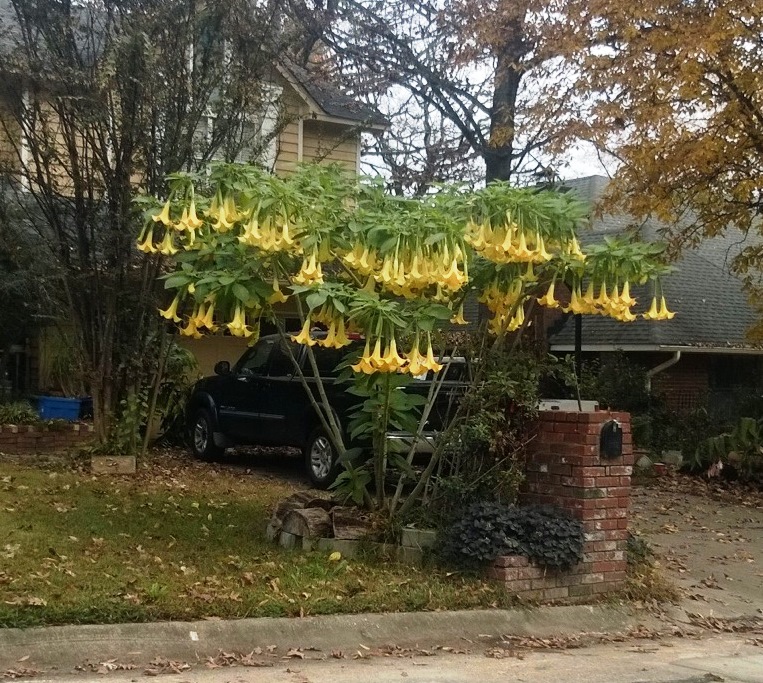Angels Trumpet
June 2, 2018
![]()
This is a plant my son has had in his yard for the 15 years he has owned his home; it came with the house. He doesn’t know what it is called. The blooms only last a couple days. Hummers and butterflies aren’t attracted to it. I should mention his home is in Southern California. Do you know what this plant might be?
![]()
The plant in question is a Brugmansia commonly called Angels Trumpet. This plant can overwinter outdoors in Arkansas, but many move it inside for the winter to make sure it grows larger and blooms earlier. I think its range of hardiness is limited to central Arkansas and southern parts, but I do have MGs that have had it survive in Fayetteville. If it is planted in the ground, it dies back totally until spring, and starts the season over. The flowers can be pink, white, orange or apricot. The entire plant is poisonous.
April 7, 2018
![]()
We tried to grow moonflowers a couple of times many years ago here in Union County, but they never survived. They are a desert plant (we grew them in Tucson), so I don’t know if it’s too wet here or if the soil is not alkaline enough. Last year we had a moonflower come up mysteriously in a spot next to the house where we have never before tried to grow one. I have no idea where it came from. But it grew about 2 feet high, had a couple of flowers, but did not set seed. It finally died down. I just noticed this morning that it has come back. Should I get something to make the soil alkaline (like what?) or is there something else that can be done to make our environment more accommodating?
![]()
There are two plants commonly called moon flower. One is the annual moonflower vine which is a morning glory - Ipomoea alba. I think the plant you are referring to is the moonflower datura --Datura inoxia. The datura is in the same genus as jimsonweed. All daturas are poisonous. Another common name is angel trumpet—which is also the common name for brugmansia, whose large trumpet shaped blooms hang downward. The moonflower datura has large, fragrant white blooms that open at night and close when the sunlight hits them. They are a short-lived perennial and should come back from the root system for a couple of years, but they can also set some spiky seed pods. There are also some purple and double purple and white varieties.
December 2, 2017
![]()
Could you tell us the name of this tree or plant?? And also where one may be purchased.

![]() Wow! That is one stunning Angel’s Trumpet – Brugmansia species. These plants are
becoming more and more popular. The other plant commonly called angel trumpet is
Datura. Brugmansia plants were typically considered winter-hardy only in southern
Arkansas for years, but are now surviving outdoors even in NW Arkansas with just a
little extra mulch. They do die back to the ground after a killing frost, but they
can grow up to 6 feet tall or more in one growing season and bloom in late summer
to fall. Flower colors range from yellow to pink and a pale orange. Some gardeners
want larger plants and earlier blooms, so they do keep them in containers and move
the pot inside for the winter. This allows the plants to begin growing from the top
not the soil line. They are often available at Master Gardener plant sales in the
spring since they do make a good “pass-along” plant. Some nurseries will also carry
them with other tropical plants.
Wow! That is one stunning Angel’s Trumpet – Brugmansia species. These plants are
becoming more and more popular. The other plant commonly called angel trumpet is
Datura. Brugmansia plants were typically considered winter-hardy only in southern
Arkansas for years, but are now surviving outdoors even in NW Arkansas with just a
little extra mulch. They do die back to the ground after a killing frost, but they
can grow up to 6 feet tall or more in one growing season and bloom in late summer
to fall. Flower colors range from yellow to pink and a pale orange. Some gardeners
want larger plants and earlier blooms, so they do keep them in containers and move
the pot inside for the winter. This allows the plants to begin growing from the top
not the soil line. They are often available at Master Gardener plant sales in the
spring since they do make a good “pass-along” plant. Some nurseries will also carry
them with other tropical plants.
All links to external sites open in a new window. You may return to the University of Arkansas System Division of Agriculture web site by closing this window when you are finished. We do not guarantee the accuracy of the information, or the accessibility for people with disabilities listed at any external site.
Links to commercial sites are provided for information and convenience only. Inclusion of sites does not imply University of Arkansas System Division of Agriculture's approval of their product or service to the exclusion of others that may be similar, nor does it guarantee or warrant the standard of the products or service offered.
The mention of any commercial product in this web site does not imply its endorsement by the University of Arkansas System Division of Agriculture over other products not named, nor does the omission imply that they are not satisfactory.